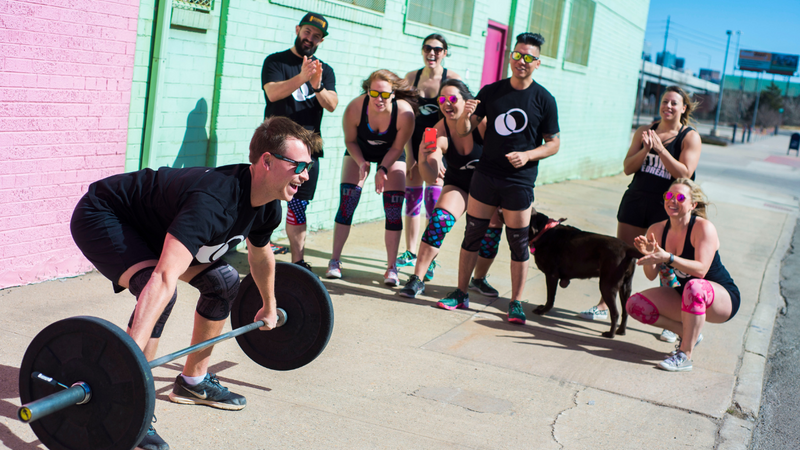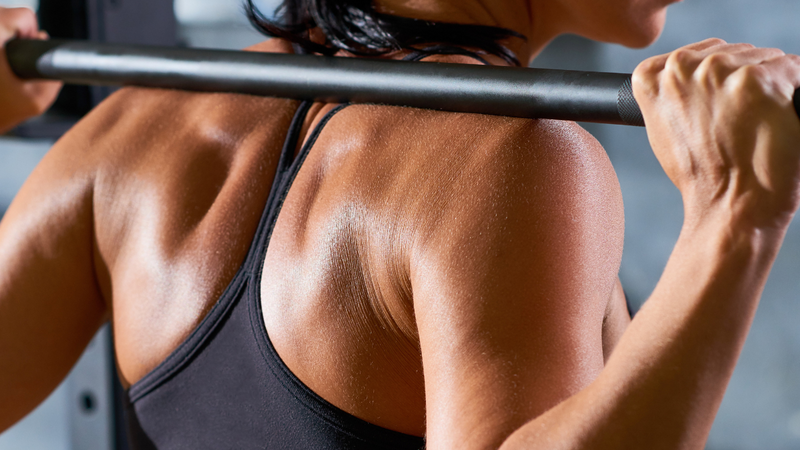By Malia Warren
I distinctly remember my parents response to me joining a CrossFit gym.
"Be careful. Don't hurt yourself. Do you know what you're doing?"
These are valid questions for sure. I questioned my sanity a couple of times at first when I stepped into the CF gym for the first time.
Here's why: a good majority of women did not get to touch a barbell unless we 1) were taught by a male friend or significant other, 2) taught ourselves by watching videos, or 3) taught as an adult by a functional fitness or lifting coach of our choosing.

Injuries are a concern of parents and athletes alike, especially with a sport that is new-ish (in terms of popularity), visibly scary for some to watch, and viewed with the assumption that it's dangerous.
Like anything people don't know about or understand, it comes with reservations and implied risk.
This actually can't be farther from the truth for the sport of weightlifting. Weightlifting is different from CrossFit/Functional Fitness in that the movements are slower and more controlled. In a weightlifting meet, the stress isn't to go as fast as you can. Instead, you have 6 attempts to prove your strength - 3 for Snatch and 3 for Clean & Jerk.
When you see weightlifting on TV in the Olympics, it's hard not to cringe just a little at the sheer amount of weight - I mean, this HAS to be one of the most dangerous sports in the world right?
Wrong.
According to a 1994 study by the Journal of Strength and Conditioning Research, the injury rate for the 1,634 participants tested was 0.0018, or 3 out of the 1,634 participants, were injured during the course of the study. When related to the participation hours, the rate was 0.0017 for every 100,000 participation hours. The same rate for gymnastics is 0.044 which is 25 times greater than weightlifting. Both are non-contact, solo sports - so we won't even mention the injury rate for contact sports like Football and Rugby.
This study is admittedly a little dated, (27 years old compared to a rapidly evolving sport is dated) but the references are strong enough to hold true today. In our USAW Level 1 certification course, the same statistics were shared. The British Journal of Sports Medicine (BMJ) posted a similar 2016 study that found that "the risk of injury in both sports were similar to other non-contact sports also requiring strength/power, but low compared to contact sports."
They tested 663 weightlifters with competitive experience of all the lifters varying from 17 months up to 12–16 years, and ages from adolescent to masters divisions. The injury rate was 2.4–3.3 injuries/1000 hours - which increases the previous statistic from Journal of Strength and Conditioning to about 300 injuries for 100,000 hours of participation, however this BMJ study was not compared to any other sport except powerlifting and it's unclear if the controls (tested subjects) were the same.

Sure, I'll admit, weightlifting can be a little more dangerous than sitting on your couch. You won't tear a shoulder muscle while watching The Biggest Loser, but I think I'd take the odds of getting stronger any day.
Overall, they found that 20% of all injuries were acute muscle injuries and 25% were due to overuse injuries of tendons and only 39% of all the injuries reported could need a longer recovery time (2 months up to longer than 2 years). Though the publication presents an updated look at the sport, I'm not a fan of how the data is presented in that it ONLY looks at lifting and does not compare it to more injury-prone, solo sports like running.
No matter how the science stacks up, though, there is such a stigma of danger surrounding the sport. The BMJ also cited that "heavy lifting is a well-known injury risk in the general population". Well, yes, to the unfamiliar, general population, of course there is a risk of injury. But there is also an injury risk in walking out your front door and getting in your car every day.
The Unknown and Unknowable
Admittedly, I HATED P.E. class in high school. I would purposefully wear the platform shoes on Run the Mile day so that I could walk it. But had someone taught me how to use a barbell properly and shown me the sport of weightlifting I think it would've changed my world - and the world of others in the same situation.
We're scared of what we don't understand. As women, we're often told that lifting weights will make us bulky. We'll look "like men". It's not safe - not something a woman should do. Pair those thoughts with not understanding how to use a barbell and it's like all the forces are working against us.
We're pushed towards more female-dominated, "safe" sports like cheerleading, gymnastics, and volleyball. Our mothers and grandmothers didn't really weightlift - so why would we be inclined to try it? In reality, other sports have higher injury rates but it's not common to hear "don't hurt yourself" or "don't score more than you can handle" when headed out onto the soccer field.
Good Coaching is Everything
So, now you know that weightlifting is one of the safest sports you can do, backed by research and science. One of the biggest factors in the low injury rate? Besides a sufficient warm-up, good mobility, and proper form of course...
Good Coaching. No, great coaching.
A good, thorough coach, will walk you through progressions and movements before you even add weight to the bar. They will stress form to prevent injuries before pushing you to go for PRs. Then they'll teach you one of the most important things in weightlifting: how to safely ditch the bar in a failed lift.
Also known as bailing, properly ending the lift is just as important if not more important than picking it up. If you can properly end the lift, you're less likely to injure yourself. We'll go over how to bail on lifts in a future post but here's some quick info:
You can't go wrong bailing backward, away from the bar and dropping it in front of you on almost any lift (weightlifting or not) - Snatch, Clean and Jerk, and Front Squat. Why front on the Front Squat? Well, you'll certainly have a hard time going backwards and getting your thighs out of the way of the bar, so rolling forward will have a lower chance of injury.
Back Squat it's best to bail forward and drop the bar back behind you while you push your body forward. For a Bench Press, we recommend using a spotter but if you have to list alone, do not use barbell clips so that if you get the barbell stuck on your chest you can tilt the bar and let the weights slide off.
For any other overhead, narrow-grip lift like Push Press, Strict Press, Thruster - just step back and away from the bar if you have to ditch it. You do not want a bar falling on your head, or really, any part of your body. Quickly step back and away from the failed lift, keeping in mind your surroundings that you don't trip or run into someone else lifting.
Before executing any lift, ensure that there are no stray plates or clips or personal items nearby that could pose an unneeded risk. When done under the supervision of a coach or with proper technique - weightlifting is easily one of the safest sports out there.

It's Up to Us Now
Let's change the way we perceive weightlifting. When mom cautions you that you don't need to lift weights, that you'll just get bulky - shut it down. When Uncle says "Lifting weights are for men" - shut it down. When your kids see you lifting and have a look of surprise, you guessed it - LIFT THAT SH*T UP!
I'll never forget overhearing my son tell his friends in the garage last summer, "My mom can lift like, 100 pounds!". Sure, I can lift more than that, but that's not what I was happy about. It was the way he said it like I'd just lifted 1,000 lbs and should be called Wonder Woman herself.
We are our kid's biggest role models. Not only our kids but our communities, too. The more we continue to smash through barriers, not just as weightlifters, but as women, too, the more we can ensure that weightlifting is a way of life.
We're so focused as a society by telling our children, "don't eat this or that, or you'll get fat", or sending them to work out because they're getting "chubby". I can tell you, as a thicker girl that has always been thick, even as a size 0-2 in high school, that the cycle is damn near impossible to break. This goes for boys too! If they grow up thinking they are "too thick" or "overweight", it stays with them. We need to teach our youth that we workout because we love our bodies and not because we hate them. We workout to be healthier and get stronger, not so we can fit into clothing that companies make. We shouldn't be made to fit into their clothing, their clothing should be made to fit us.
Weightlifting, Powerlifting, and Weight Training are sports that provide a feeling of strength for most people - can you imagine if we were taught to value this early on in our lives rather than fear it because we "might get hurt"?
This is a topic that I'm super passionate about so look out for future posts touching on it again.
If you have any questions or you would like to be a guest blogger, please email us at blog@liftingthedream.com
What are some of the responses you've gotten when you tell people you lift?
 |
Malia is the force behind Lifting the Dream and a proud mompreneur. When she's not lifting heavy weights, she's probably at the beach or Disney with her family. She is a Cali girl born and raised, with salt water in her veins and sunshine in her heart. She and her family now reside in Florida soaking up the sun, heat, and all the amazing outdoor activities this state has to offer. |





0 comments